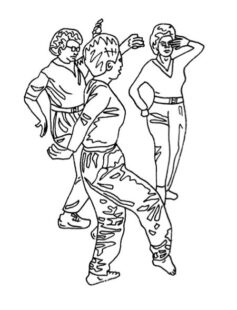
- This event has passed.
Postponed: Olivia Plender: Our Bodies are Not the Problem, Session 5
Saturday, 10th June, 2023, 1:00pm to 3:30pm
FreeWe’re sorry this event has been postponed due to illness – look out for a new date on our website
Olivia Plender: Our Bodies are Not the Problem, Fifth Session Saturday the 10th of June, 1pm to 3.30pm, GWL, Free

Following her redesign of our community room, inspired by the book Our Bodies, Ourselves, Olivia Plender will host a series of monthly meetings. These will offer a space for participants with chronic health conditions to discuss struggles within a medical system that often dismisses ‘women’s problems’ and how this relates more widely to experiences of racism, sexism, ageism, queer- and trans-phobia.
We hope to share insights into coping strategies, techniques for dealing with doctors, employers and the authorities as well as methods for self-care.
Artist’s statement about the project:
I am looking for women with chronic health problems who would be interested in participating in discussions about women’s health inequality. I am an artist and I also have a chronic health problem. I have been hosting a series of meetings at Glasgow Women’s Library starting in December 2022, in order to share experiences with other women of living with chronic illness. Many women, including myself, have their symptoms dismissed as ‘women’s problems’ and end up feeling ‘gas lit’ and isolated, as we struggle for years to get a diagnosis and access any kind of care from the mainstream medical establishment. Illnesses that affect females in larger numbers than males are under-researched and even today are often dismissed as psychological by health professionals.
In the 1970s the Boston Women’s Health Book Collective set up a consciousness-raising group, in order to educate themselves and other women about their bodies and campaign for better health care for women, which led to the book Our Bodies, Ourselves. One of the purposes of these meetings will be to compare experiences and, inspired by Our Bodies, Ourselves, discuss how these experiences related to wider structures of oppression, such as racism, sexism, queer and trans-phobia for example. However, I also think of illness as an experience that leads to a great deal of knowledge and I am interested in sharing coping strategies and techniques for dealing with doctors, employers and the authorities. The aim is to compile some of this knowledge into a publication at the end of the process, with the consent of the participants.
I hope to be able to hold most of the meetings in the Community Room at GWL, which I redesigned in 2021 in order to make it more comfortable and accessible for the groups using it. However, I am very happy to discuss your access needs and will plan each meeting in relation to the needs of those participating.
For more information about Olivia Plender’s previous work with GWL see the Life Support Project.
